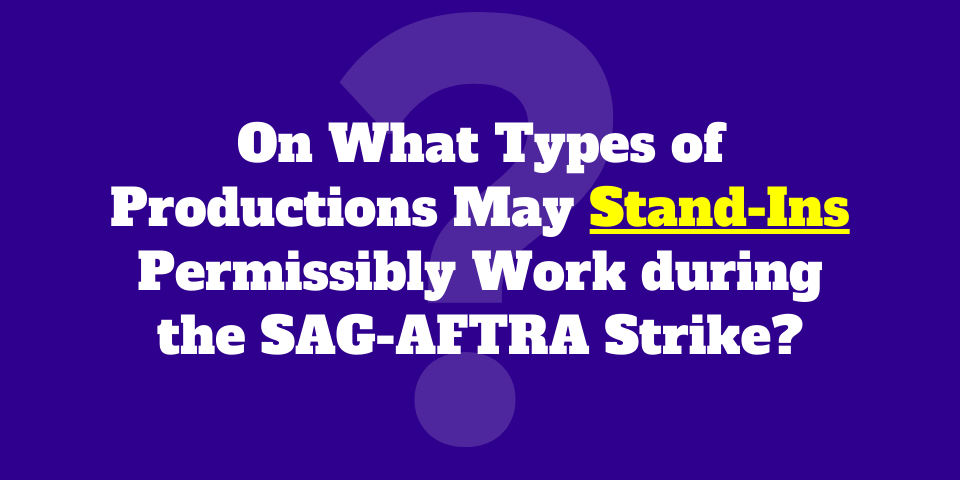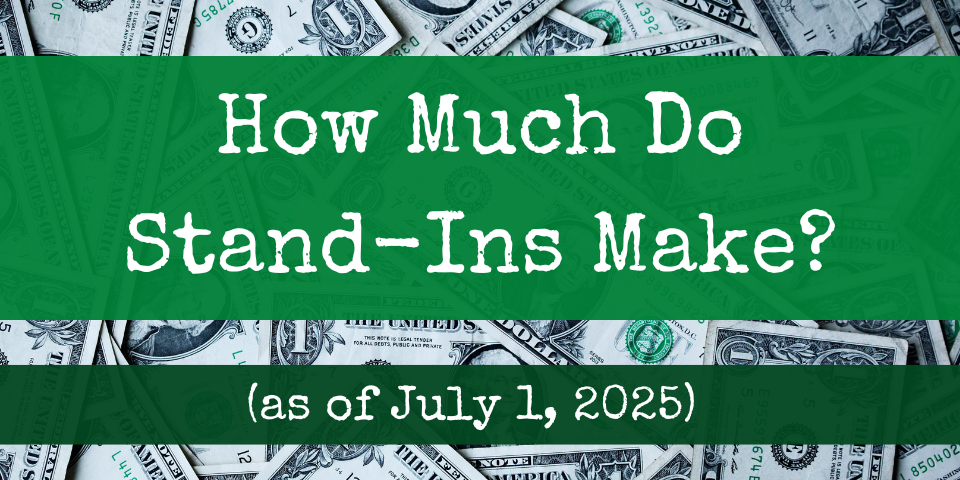As you are probably aware, SAG-AFTRA is on strike. However, not all of SAG-AFTRA is on strike.
SAG-AFTRA has a number of contracts (called “collective bargaining agreements” or “CBAs” for short), covering a wide range of work.
From the layperson’s perspective, some of those contracts are very easily differentiated. For example, SAG-AFTRA has a contract covering major motion pictures, and another contract covering commercials.
Other contracts are less easily differentiated to the layperson, such as the contracts covering different kinds of television productions. To that point, SAG-AFTRA has two major contracts covering television shows. SAG-AFTRA’s Television Agreement typically covers “dramatic television shows,” and SAG-AFTRA’s Network Television Code (aka the Netcode) typically covers television shows that have in-studio audiences.
With that said, soap operas — which are no doubt dramatic! — are covered under the Netcode, not the Television Agreement. The reasons are largely based on the history of these contracts, not some to-be-decoded categorization algorithm.
Let’s break this all down so we can answer the question of “On what types of productions may stand-ins permissibly work during the SAG-AFTRA strike?”
Where Is SAG-AFTRA on Strike?
The short of it is that SAG-AFTRA is on strike and withholding work against major motion pictures and dramatic television shows. It comes down not to the kind of work, but the kind of contract — or more specifically to who is SAG-AFTRA’s opponent at the bargaining table.
- Currently, SAG-AFTRA is on strike where work is produced under the Theatrical Agreement, which covers major motion pictures.
- SAG-AFTRA is also on strike where work is produced under the Television Agreement, which covers dramatic television shows.
Historically, SAG-AFTRA (and its predecessor SAG) has negotiated these contracts simultaneously. In fact, the Television Agreement incorporates aspects of the Theatrical Agreement — primarily for our purposes, the sections of the Theatrical Agreement that cover background actors, including stand-ins.
And historically, SAG-AFTRA (and SAG before it) has negotiated these contracts opposite the Alliance of Motion Picture and Television Producers (the AMPTP). The AMPTP is an organization that bargains on behalf of its members, which are employers (typically called “producers”). So, SAG-AFTRA bargains the Theatrical Agreement and the Television Agreement opposite the AMPTP.
So, SAG-AFTRA is on strike against work negotiated by the AMPTP, meaning SAG-AFTRA is on strike against work done by producers represented by the AMPTP, work done under the Theatrical Agreement and the Television Agreement.
Being that these are major contracts SAG-AFTRA has that cover a lot of its unit members’ work, this brings a lot of visible SAG-AFTRA work to a halt.
With respect to stand-ins, anecdotally, most stand-ins work under these two contracts, so most stand-ins are not working right now because production has largely ground to a halt because of the SAG-AFTRA strike. (Production has also ground to a halt in part because of the simultaneous writers’ strike.)
What Work Is Left for Stand-Ins to Do Now?
In short, stand-ins may stand in on union productions where SAG-AFTRA has not called a strike.
This is largely, again, because of the way the contracts are written.
No-Strike Clauses
Most SAG-AFTRA contracts have a “no-strike clause.” This paragraph generally says that SAG-AFTRA workers cannot go on strike in work done under that contract unless the contract is expired.
Being that SAG-AFTRA’s various contracts tends to have different expiration dates, this means SAG-AFTRA can call strikes at different times.
To that point, SAG-AFTRA has to call a strike in order for an actual strike to be in effect.
For example, this is the “no-strike clause” from the Netcode, appearing in Paragraph 93 of that contract:
So long as the Producer performs this Code, SAG-AFTRA will not strike against the Producer as to the performers covered by this Code in the field covered by this Code. To the extent SAG-AFTRA has agreed not to strike, it will order its members to perform their contracts with the Producer.
Strike Authorization
In order for SAG-AFTRA to call a strike, not only does the contract have to be expired (or extended by agreement between SAG-AFTRA and its bargaining opponent), but SAG-AFTRA also has to have strike authorization from its voting members.
This is because SAG-AFTRA’s Constitution requires it to have strike authorization before calling a strike. In general, SAG-AFTRA’s Constitution does not give SAG-AFTRA authority to call a strike without such authorization.
In SAG-AFTRA’s Constitution, Article XI(E) spells out details about strike authorization:
With respect to any multi-employer or national agreement, the National Board may declare a strike against any employer upon a vote of seventy-five percent (75%) of the members affected thereby voting on the question. Such vote shall be conducted either by (a) a membership referendum conducted by mail or electronic means, under policies and procedures established by the National Board; or (b) in membership meetings, under policies and procedures established by the National Board. Where an employer is seeking to impose a final offer or to terminate an agreement, the National Board shall have emergency authority to authorize and declare a strike.
Based on this paragraph, the entity within SAG-AFTRA calling the strike is not SAG-AFTRA per se, but its National Board.
Generally speaking, SAG-AFTRA’s National Board has authority to call a strike against “any employer” (i.e., any producer) insofar as:
- SAG-AFTRA puts a strike-authorization vote before is membership, and
- That membership provides enough yes votes to authorize the National Board to call a strike (if it so chooses).
That tally of yes votes, though, is not a simple majority of 50% plus one vote. Instead, of those members who cast a vote on the referendum, 75% of them must vote yes to authorize the National Board to call a strike (again, if it so chooses).
(SAG-AFTRA does not tend to vote on strike authorization in membership meetings, but rather through referenda, though meeting-based voting is permitted per SAG-AFTRA’s Constitution.)
A Strike Is Called
If a SAG-AFTRA contract is expired, and if SAG-AFTRA has strike authorization, then its National Board has the authority (if it chooses to do so) to call a strike against an employer under that contract.
This tends to mean the production will stop work.
This also tends to mean that if a SAG-AFTRA member performs work for that struck employer during that strike period, SAG-AFTRA may seek discipline against that SAG-AFTRA member for violating SAG-AFTRA Membership Rules.
Membership Rule 1(a) states:
No member shall render any services, or make an agreement to perform services, for any employer against whom the Union is conducting a strike, nor shall any member otherwise violate any strike order of the Union.
SAG-AFTRA can discipline SAG-AFTRA members in a range of ways, including fining and expulsion from union membership.
About Membership Rules
It should be noted that those in SAG-AFTRA who are “fi-core” — meaning SAG-AFTRA views them as nonmembers, but they pay SAG-AFTRA agency fees in order to work on its covered jobs — are immune from discipline under SAG-AFTRA membership rules, so in effect they may work for a struck employer during a strike. It is only SAG-AFTRA members who face potential discipline from SAG-AFTRA if they perform struck work.
It should also be noted that expulsion from SAG-AFTRA membership does not mean the now nonmember would be disallowed from working union jobs. As long as the expelled member continues to pay SAG-AFTRA appropriate agency fees, that expelled now-nonmember may work union jobs in the future.
A Strike Is Not Called?
If a contract expires and SAG-AFTRA does not call a strike, then, generally speaking, SAG-AFTRA workers who withhold services may face lawful termination by the employer/producer.
Similarly, if a SAG-AFTRA contract is not expired and a SAG-AFTRA worker decides to withhold services because another union is on strike, that SAG-AFTRA worker may face lawful termination. This is largely because of the no-strike policy in place, which largely serves to curtail individual or group strike actions by unit workers without an official strike call by SAG-AFTRA.
On Sympathy Striking
During the beginning of writers strike (which preceded SAG-AFTRA’s strike by a couple months), there were reports of SAG-AFTRA members not working hosting jobs covered under the Netcode, and the reasons these SAG-AFTRA members had for doing so were to support the writers strike. On the face of these stories, these SAG-AFTRA members faced lawful termination by their employers for their actions because SAG-AFTRA had not called a Netcode-based strike and their Netcode contract had a no-strike policy. In other words, their striking in sympathy for another union’s workers was not a protected reason for withholding services from these employers. It is unknown whether these SAG-AFTRA members were or will be lawfully terminated in light of their reported actions.
What’s Left for Stand-Ins Right Now?
This is not an exhaustive list, but for stand-ins, work on which stand-ins may permissibly stand in are productions shooting under the following SAG-AFTRA contracts (as of September 20, 2023):
- Commercials Contract
- Corporate-Educational and Non-Broadcast Contract
- The Network Television Code (aka the Netcode)
- Interim Agreements
What this translates to is that stand-ins can work on commercials.
Stand-ins can also work on corporate productions, educational productions, and productions generally not-for-broadcast, sometimes called “industrials.”
This also translates to that stand-ins can work on television promos and in-studio audience shows like talk shows and soap operas (all covered by Netcode). However, aside from soap operas, because of the writers’ strike much of this work is dark (such as work on most late-night talk shows).
Interim Agreements are contracts largely has set up with individual (aka “independent”) producers permitting them to produce major motion pictures and dramatic television shows during the strike, given they abide terms generally in line with the demands SAG-AFTRA has recently made of the AMPTP.
The website Deadline recently reported a list of productions currently signed to Interim Agreements. Deadline’s article is here (keep in mind this list may not be up-to-date, and SAG-AFTRA may be a better authority on the signatory status of these or other productions).
About Interim Agreements
There is argument whether these Interim Agreements are “waivers” permitting certain producers to work.
The Interim Agreements are not waivers of any contract, but rather are legitimate contracts in and of themselves.
Interim Agreements have controversy around them because they permit SAG-AFTRA unit workers to work in a similar domain as where work is struck (i.e., work on a feature film even though SAG-AFTRA is on strike against these types of productions). The presence of work under Interim Agreements creates some level of jealousy from some striking workers not working during this time, and some sentiment that the existence of this work during the strike undermines the strike’s effect in bargaining. Others believe the struck producers inevitably will benefit economically from these independent productions and their box office and streaming performance down the line.
Ben's Tip!
If a major motion picture or dramatic television program is shooting under an Interim Agreement, its terms may be different from the Interim Agreement of another motion picture or dramatic television program. It may be worthwhile to ask SAG-AFTRA for a copy of your production’s Interim Agreement so you understand the terms under which you are working.
Conclusion
All in all, stand-ins may work during the current strike, though given that the current strike is against productions where most stand-ins do work, the jobs where they may work may be hard to come by.
Do you have any insights from working as a stand-in during the current SAG-AFTRA strike? Share your insights in the comments below!







Leave A Comment